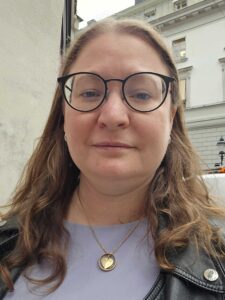
2025 is the 20-year anniversary of Fluid Translation. To mark the occasion, Fluid has prepared a series of articles about how we as a company have developed over the years into being a Nordic leader in the field of translation for investor relations and finance. We start with an interview with Fluid’s founder, Larissa Ekonoja, looking back to how it all started.
What first inspired you to pursue a career in the language industry, and how did your journey begin?
I started working in translation after spending five years as a line manager and project leader at OMX Nasdaq. I worked in the European IT/finance industry for the better part of a decade after finishing my university degree in computer science, and I wanted to travel less and focus more on people. We relocated to Stockholm from Luleå, where I had moved in the mid-90s as an exchange student, and I decided to take a breather from the high tempo at Nasdaq and started freelancing, basically on a whim. After a few months, I built up a steady stream of clients who were in need of a translator with a solid background in finance and great project management skills. I intended to work for 6–12 months before going back to IT but changed my mind, as I started to build a company that I wanted to work for. And I’m still here after 20 years!
How has the industry changed since that time, and how have you adapted to those changes?

Over the years, our business has changed a great deal. We have moved from looking up terms in paper dictionaries printed by Luleå Technical University to using highly specialised online translation environments.
In the beginning, we were making frustrated attempts to work with the first versions of computer-aided translation interfaces, while manually checking for quality assurance and proofreading every report carefully on paper for errors in figures.
Today, translation tools are technically reliable, perform automatic advanced quality assurance and offer a range of previously used terms and phrases on the fly. We don’t have to spend time worrying about data loss or checking off numbers in paper copies.
I have generally been happy about this major improvement, but at the same time, the rise in automation has led to less human interaction. Many agencies in the translation industry now use a client portal, which cuts interaction with customers down to the minimum. However, I’m in this industry to help people communicate well, which for me means that personal relationships and responsibilities are key, so I’ve kept us solidly away from any automatic tools that cut down on our client or supplier interactions.
What has been the most rewarding part of your career so far?
The most rewarding parts of my career to date have been creative problem solving, building relationships and creating strategic solutions. I really enjoy the intersection between people and processes because it lets me solve problems while making people happy. Delivering the impossible, taking care of my staff and finding the client’s perfect solution are just three examples.
What are some of the biggest challenges you’ve faced over the past 20 years, and how did you overcome them?
Being an entrepreneur is about surprises, and I have had my share. There was the year a financial translator called from the emergency room early on a Saturday to say she couldn’t deliver 12,000 words of a client’s financial report later that day. I made some panicked calls to my translation team, offered to pay weekend rates and divided up the work. I also brought in an extra editor to make the language flow consistently since I had three or four translators trying to sound like one. I’m excited to say we delivered on time and the client was happy with the quality, but it was hectic.
Two of our biggest recurring challenges have been how to juggle multiple, unplanned large financial reports and how to find enough skilled and qualified financial translators to deliver consistently throughout our annual reports season. The number of simultaneous financial reports we can produce is limited by our pool of experts . Our translators generally have experience in areas such as banking, financial trading, Sweden’s Riksbank (National Treasury), financial journalism etc. Our workload is highest during the financial ‘silly season’ around annual reports.
Last but not least, Larissa, when not heading the company, enhancing processes, implementing technologies, or handpicking financial translators, how do you spend your time?
My family is really important to me, especially as an expat, so I spend a lot of time watching my kids play sports and perform in concerts. I also love technology in all its raw forms, so I am finishing a Master’s degree at KTH in machine learning in computer science, which is ironic since we do not use AI for financial translation at all. On the weekends, I garden and play board games with friends, who consider me a total nerd. My husband taught me to always have something to look forward to, so I try to always have concert tickets to a great rock concert and a trip booked for the future. Part of middle age for me has been finding my interests and time to enjoy them. Learning to balance work with my private life is just one of my entrepreneurial skills.
